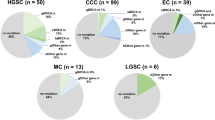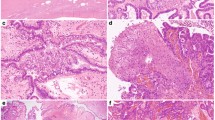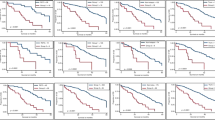Abstract
Inactivation of the tumour-suppressor gene p53 has been demonstrated in a variety of human tumours. We extracted DNA from paraffin-embedded tissues of 67 ovarian carcinoma samples (54 primary tumours, seven metastases and six tumours obtained after chemotherapy), and analysed allelic losses and mutations of the p53 gene using single-strand conformation polymorphism (SSCP) analysis of DNA fragments amplified by a polymerase chain reaction (PCR). Allelic loss was observed in 24 of 32 informative cases. The mutation was detected in 14 of 54 primary ovarian carcinomas: eight serous cystadenocarcinomas (SCA), 42%), five endometrioid adenocarcinomas (EA, 42%) and one mucinous cystadenocarcinoma (14%). The incidence of the alteration was higher in SCA and EA than in other histological types, but the difference was not statistically significant. The incidence of p53 gene abnormalities in ovarian carcinomas tended to be increased in patients with disease advanced (over FIGO stage II). Mutations were found in exons 5 and 7 only and consisted mainly of single nucleotide substitutions [9 or 14 (64%) in exon 7; 4 of 14 (29%) in exon 5]. In 13 of 14 cases, p53 gene mutations occurred concomitantly with losses of the normal allele. The status of the p53 gene in metastases and the tumours obtained after chemotherapy was identical to that in the primary tumours. The presence of p53 gene mutation did not correlate with histological grade, response to primary therapy and survival. These findings suggest that mutational alterations of the p53 gene are involved in the development of a significant proportion of some ovarian carcinomas (SCAs or EAs), especially in advanced stages. However, they may not be a marker predicting the biological behaviour or the outcome of the disease.
This is a preview of subscription content, access via your institution
Access options
Subscribe to this journal
Receive 24 print issues and online access
$259.00 per year
only $10.79 per issue
Buy this article
- Purchase on Springer Link
- Instant access to full article PDF
Prices may be subject to local taxes which are calculated during checkout
Similar content being viewed by others
Author information
Authors and Affiliations
Rights and permissions
About this article
Cite this article
Niwa, K., Itoh, M., Murase, T. et al. Alteration of p53 gene in ovarian carcinoma: clinicopathological correlation and prognostic significance. Br J Cancer 70, 1191–1197 (1994). https://doi.org/10.1038/bjc.1994.472
Issue Date:
DOI: https://doi.org/10.1038/bjc.1994.472
This article is cited by
-
Clinical relevance of TP53 hotspot mutations in high-grade serous ovarian cancers
British Journal of Cancer (2020)
-
TP53 mutations in early-stage ovarian carcinoma, relation to long-term survival
British Journal of Cancer (2004)
-
Atypical epithelial changes and mutant p53 gene expression in ovarian endometriosis
Pathology & Oncology Research (2001)
-
Loss of heterozygosity on chromosome 6q27 and p53 mutations in epithelial ovarian cancer
Medical Oncology (1998)
-
Drug resistance in ovarian cancer — the role of p53
Pathology & Oncology Research (1998)



